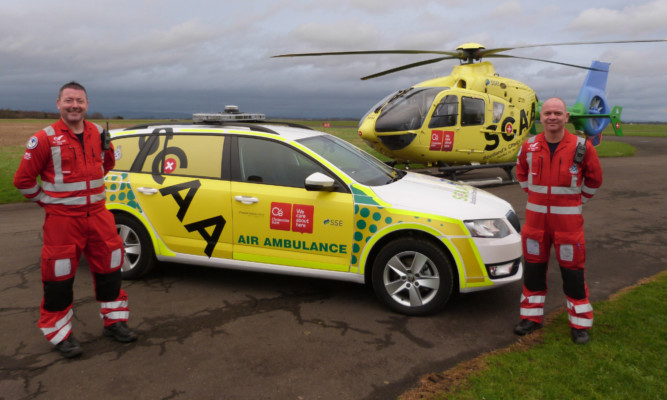An emergency involving a choking baby was the first mission for Scotland’s Charity Air Ambulance (SCAA) new upgraded rapid response vehicle.
The Skoda Octavia 4×4 replaces the previous Kia Sportage which has become a familiar sight at emergencies within a five-mile radius of the Scone air base.
The RRV which has been a part of SCAA’s life-saving options since the service launched in 2013 is also used when the helicopter is grounded for extreme weather or technical reasons.
SCAA lead paramedic John Pritchard said the state-of-the-art vehicle is another vital asset in SCAA’s fast reaction life-saving capabilities.
“The new bespoke car gets paramedics rapidly to emergencies within the local area allowing early clinical assessment and intervention,” he said.
“Its spacious interior allows us to carry all the essential life-saving drugs and equipment for immediate treatment and resuscitation.
“The interior has also been customised for our specific needs, creating the perfect operational road partner for SCAA paramedics and a highly effective emergency response service for the critical care of patients.”
SCAA’s non-transporting paramedic response vehicle has been deployed more than 100 times since the service launched and the latest model is already proving invaluable.
High-tech additions for SCAA’s latest vehicle include an on-board camera and computer-controlled emergency warnings with siren and blue light configurations.
The vehicle is also fitted with an anti-theft device which allows the key to be removed while the engine remains running so as to power emergency warning systems while the vehicle is stationary, unmanned and secured.
SCAA chief executive David Craig explained that a rapid response road vehicle was a recognised asset within most charity air ambulance operations elsewhere in the UK.
“The RRV provides additional resilience to our operation, enabling us to respond rapidly to emergencies whenever there is planned maintenance on the helicopter or when a nearby location is much quicker and easier to locate by road,” he said.
“This ensures SCAA continues to provide a life-saving service to those that require time-critical care.”
